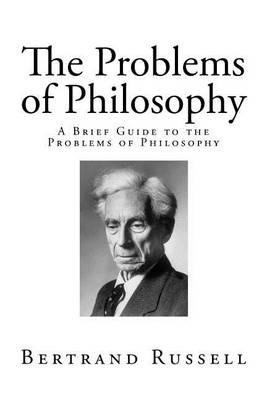Overview
CLASSIC PHILOSOPHY The Problems of Philosophy By Bertrand Russell Is there any knowledge in the world which is so certain that no reasonable man could doubt it? This question, which at first sight might not seem difficult, is really one of the most difficult that can be asked. When we have realized the obstacles in the way of a straightforward and confident answer, we shall be well launched on the study of philosophy--for philosophy is merely the attempt to answer such ultimate questions, not carelessly and dogmatically, as we do in ordinary life and even in the sciences, but critically, after exploring all that makes such questions puzzling, and after realizing all the vagueness and confusion that underlie our ordinary ideas. In daily life, we assume as certain many things which, on a closer scrutiny, are found to be so full of apparent contradictions that only a great amount of thought enables us to know what it is that we really may believe. In the search for certainty, it is natural to begin with our present experiences, and in some sense, no doubt, knowledge is to be derived from them. But any statement as to what it is that our immediate experiences make us know is very likely to be wrong. It seems to me that I am now sitting in a chair, at a table of a certain shape, on which I see sheets of paper with writing or print. By turning my head I see out of the window buildings and clouds and the sun. I believe that the sun is about ninety-three million miles from the earth; that it is a hot globe many times bigger than the earth; that, owing to the earth's rotation, it rises every morning, and will continue to do so for an indefinite time in the future. I believe that, if any other normal person comes into my room, he will see the same chairs and tables and books and papers as I see, and that the table which I see is the same as the table which I feel pressing against my arm. All this seems to be so evident as to be hardly worth stating, except in answer to a man who doubts whether I know anything. Yet all this may be reasonably doubted, and all of it requires much careful discussion before we can be sure that we have stated it in a form that is wholly true.
Full Product Details
Author: Bertrand Russell
Publisher: Createspace Independent Publishing Platform
Imprint: Createspace Independent Publishing Platform
Dimensions:
Width: 15.20cm
, Height: 0.90cm
, Length: 22.90cm
Weight: 0.236kg
ISBN: 9781484164334
ISBN 10: 1484164334
Pages: 172
Publication Date: 19 April 2013
Audience:
General/trade
,
General
Format: Paperback
Publisher's Status: Active
Availability: Temporarily unavailable

The supplier advises that this item is temporarily unavailable. It will be ordered for you and placed on backorder. Once it does come back in stock, we will ship it out to you.
Author Information
Russell began his published work in 1896 with German Social Democracy, a study in politics that was an early indication of a lifelong interest in political and social theory. In 1896 he taught German social democracy at the London School of Economics, where he also lectured on the science of power in the autumn of 1937. He was a member of the Coefficients dining club of social reformers set up in 1902 by the Fabian campaigners Sidney and Beatrice Webb. He now started an intensive study of the foundations of mathematics at Trinity. In 1898 he wrote An Essay on the Foundations of Geometry which discussed the Cayley-Klein metrics used for non-Euclidean geometry. He attended the International Congress of Philosophy in Paris in 1900 where he met Giuseppe Peano and Alessandro Padoa. The Italians had responded to Georg Cantor, making a science of set theory; they gave Russell their literature including the Formulario mathematico. Russell was impressed by the precision of Peano's arguments at the Congress, read the literature upon returning to England, and came upon Russell's paradox. In 1903 he published The Principles of Mathematics, a work on foundations of mathematics. It advanced a thesis of logicism, that mathematics and logic are one and the same. At the age of 29, in February 1901, Russell underwent what he called a sort of mystic illumination , after witnessing Whitehead's wife's acute suffering in an angina attack. I found myself filled with semi-mystical feelings about beauty... and with a desire almost as profound as that of the Buddha to find some philosophy which should make human life endurable , Russell would later recall. At the end of those five minutes, I had become a completely different person.




